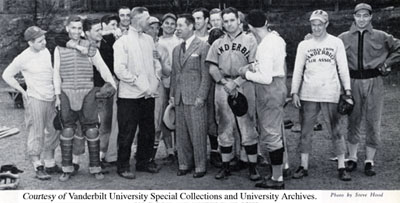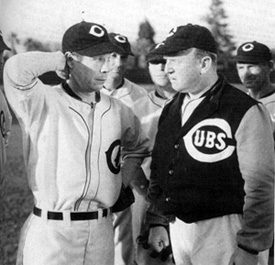April 15, 2009

Joe E. Brown with the 1940 Vanderbilt baseball team
![]() Actor visits the 1940 ‘Dores (pdf) | Commodore History Corner Archive
Actor visits the 1940 ‘Dores (pdf) | Commodore History Corner Archive
Over the years I have written about many great non-Vanderbilt athletes to appear on the University’s campus. Athletes as Red Grange, Gale Sayers, George Halas, Dick Butkus, Jim Thorpe, Tris Speaker and the baseball Hall of Fame trio Frank Chance, Joe Tinker and Johnny Evers have recorded visits.
During a spring workout in 1940, Joe E. Brown, a comedic actor, dropped by to visit the Commodores baseball team. It might not seem a big deal, but Brown would make a small contribution to “America’s Pastime” by attending ball games as a devoted fan while making movies about baseball.
Brown was best-known in the early part of the 20th century for his baseball film trilogy Fireman, Save My Child (1932), Elmer the Great (1933) and Alibi Ike (1935). It was widely known in Hollywood of Brown’s enthusiasm for the game of baseball. He was persistently seen in the company of baseball players. The high school in his birthplace (Holgate, Ohio) dedicated a corner stone to its stadium.
In the movie Fireman, Save My Child, Brown is cast as “Smokey” Joe Grant a small town fireman with a girlfriend, Sally (Evalyn Knapp). Grant’s pitching proficiency has earned him a spot on the St. Louis Cardinals roster. His character has invented a fire extinguisher that he says, “lets loose chemicals that’ll smother the blaze like a wet blanket.” While trying to sell his invention, Grant forgets that he is pitching in the seventh game of the World Series.
The book “Great Baseball Films” by Rob Edelman gives a synopsis of the movie: “Back in his hometown of Rosedale, Kansas, Grant is a hero. Kids fawn over him, and his teammates and opponents patiently await his return if he is called away during a game to fight a fire. But in St. Louis, his manager (Guy Kibbee) is forever gruff and growling, and his teammates ride him for his country values. Grant innocently starts up a friendly conversation with a woman, who automatically assumes he is a masher. June (Lillian Bond), a gold digger, hoodwinks him, taking all his money. `It must be too exciting to live in a small town,’ she snootily observes. But Sally loves him for who he is, not for his money. Despite his various distractions, he manages to perform the requisite heroics at the finale, leading the Cards to victory against the New York Yankees in the World Series.”
Ring Lardner was a sports writer in the early part of the 20th century. Along with Tennessee-native Grantland Rice, these were the two best-known sports writers in the country. Lardner was also a writer of fictitious short stories related to baseball. Elmer the Great is based on Lardner’s work. Edelman gives this plot in Brown’s second baseball movie Elmer the Great:
“Elmer Kane is a home run hitter rather than a pitcher, and he comes with a small-town Indiana girlfriend (Patricia Ellis)–his major league team is the Chicago Cubs. He is `sassy and ignorant’ braggart and rube, whose personality is contrasted to a new paint job: `fresh and all wet.’ He alienates his teammates, who make him the butt of their humor. He leads the Cubs to the summit of the standings. He refuses to be bought by gamblers. He fights and makes up with his girl. He thwarts a sneaky Yankees pitcher’s attempts to cheat by making it appear that he is hurling a ball when he really isn’t. He wins the deciding game of the World Series with an inside-the-park homer. And he, too, refers to the World Series as the “World Serious.”
 |
|
| Joe E. Brown (left) and William Frawley (right) from movie Alibi Ike |
Another one of Lardner’s work was made into a movie that completes Brown’s baseball trilogy. Edelson gives this scenario of Alibi Ike:
“Brown is cast as Frank X. Farrell, fireballing right-handed rookie pitcher who comes to the Chicago Cubs from Sauk Center, a small town. Farrell is a comical character with a silly, exaggerated pitching motion, and he first appears on-screen by crashing his car through an outfield wall. However, Farrell is as brash and overconfident as he is talented. After throwing blazing strikes, he observes that he is not even trying, that he has not even warmed up. He utters such lines as `I don’t never brag,’ and then immodestly describes his athletic abilities. Plus, he is constantly making excuses.
“The veteran ballplayers humor Farrell by playing pranks on him. He becomes romantically involved with his manager’s sister-in-law (Olivia de Havilland). Gamblers attempt to bribe him into throwing the game that will land the Cubs in the `World Serious.’ Eventually he is kidnapped, but he escapes in time to smack a game winning inside-the-park home run, diving all over the catcher, who comes out to block the plate. He and his girl have a spat but are reunited in the finale.”
Brown would make another baseball stop while in Nashville at the Sulphur Dell ballpark to visit with the Nashville Vols of the Southern Association the next year. The Tennessean reported that the best Vols hitters in batting practice were much better than “the appearance of Movie Comedian Joe E. Brown swinging at several pitches. The big-mouthed cinema start had difficulty connecting with the ball, for he was unable to find a left-handed bat. At least, he gave that as a reason for his inability to hit the right field fence.”
Brown played some minor league baseball before he pursued an acting career. Therefore his natural athleticism was realistic in his roles as a baseball player. He began his movie-acting career in 1928 and is best remembered for his role in the classic film Some Like It Hot. In that movie, Brown played the part of millionaire Osgood Fielding III who falls for Daphne (played by Jack Lemmon in drag). Co-stars were Tony Curtis and Marilyn Monroe.
Brown was also a television and radio announcer for the Yankees in 1953. His son, Joe L. Brown, was a longtime general manager for the Pittsburgh Pirates. Joe E. Brown died in Brentwood, California in 1973 just weeks short of his 81st birthday.
If you have any comments or suggestions you can contact Bill Traughber via e-mail WLTraughber@aol.com.



